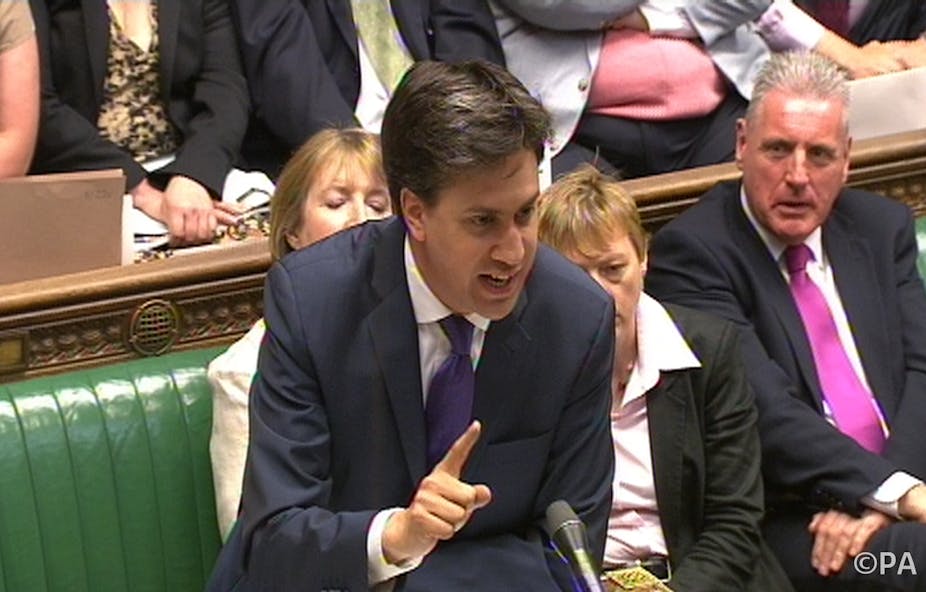Ed Miliband’s plan to reform Labour relationship with the union movement has its origins much deeper than the recent Falkirk debacle.
Of course, Unite in Falkirk West and 40 other constituency Labour parties (CLP) – through recruiting its members to Labour – has been trying to secure its candidates as prospective parliamentary candidates in safe Labour seats for the 2015 general election. But the penny has not dropped about why Unite has targeted CLPs.
This is because Labour is now so centralised under its leader that its annual conference, National Policy Forums and National Executive Committee count for virtually nothing. They have been so hollowed out that Unite realised the only way to influence the party was to increase its presence in the parliamentary Labour Party as way of trying to influence the shadow cabinet and the leadership. Just having sponsored MPs in party was not enough.
Rather than collectively discussing ways of reforming the union-Labour link with the 15 affiliated unions, Miliband engaged in “dog-whistle” politics by quickly responding to the taunts of the Tories and the mischief making of the Blairites.
The proposal to allow non-party members to vote in elections for parliamentary candidate selection, as in the primary system in the USA, potentially opens up Labour internal processes not only to individuals antipathetic to Labour, but also to those resource-rich forces who favour the most right-wing candidates. As in the USA, it is mostly the “money that talks” in this system.
The proposal to only allow union members who pay the political levy to be involved in the affairs of Labour seems less contentious. It seems like a clever way to reduce the influence of union affiliates, and in particular their general secretaries.
Matter of principle
But stepping back from the detail of this proposal, it becomes clear Miliband is trying to solve a political problem with an administrative solution. If he genuinely wants to return to when Labour was a mass party with substantial roots in working class communities, he needs to recognise that this situation existed primarily because Labour was then a social democratic party which aimed to reform the capitalist system.
This was neither socialism nor revolution, but it did mean that people’s life chances were not solely determined by the market.
It is inconceivable that a mass of citizens, union members or not, will flock back to supporting Labour, much less join and become active members, until its politics fundamentally return to the left. This is why the maelstrom that Unite has unleashed is not about candidate selection or even candidate composition. It is about political values.
Labour has long since stopped being a social democratic party. Under Tony Blair, from 1994 onwards, it became a social liberal party, adopting a social liberal form of neo-liberalism. If Labour does want to regain its former levels of support from working class citizens (who remain objectively the largest social group in society), the party must adopt the politics of hope and ambition – the hope and ambition to make the mass of citizens’ lives better through regulating the processes and outcomes of the market.

The lesson of the Blair experience, when membership dramatically increased up to and after 1997, is that members left in droves after they became disillusioned with social liberalism. They discovered, despite the hope engendered by Labour returning to office after 18 years, that the price of gaining that office was too high, as the political principle they held dear were jettisoned.
High-stakes gamble
It is a measure of Miliband’s determination to reduce organised union influence that he is also prepared to contemplate depriving Labour of funding from its biggest donors at a time when the party is cash-strapped and has a general election to fight in 2015.
Hundreds of thousands of political levy-paying members won’t become individual Labour members. And with caps on political donations due to be introduced, unions would not be able to complement this reduced amount of money they give to Labour by making additional donations.

The reaction from the unions has been surprisingly mixed. GMB – the third biggest union affiliate with 617,000 members and a levy of more than £2 million – announced it will ballot members on how much it donates to Labour. This is a way to reduce its funding to the party because it feels Miliband is trying to ostracise union affiliates in order to placate his political opponents.
Ironically, Unite was relatively positive, indicating that it may be trying to end the political fallout from its activities in Falkirk West. Unison made no response while the CWU communication workers’ union was highly critical.
The irony of the fate of the reforms is that under existing structures, Miliband needs to secure union support for his proposals to be passed and implemented. Some may feel compelled to support them because they think Labour will be unelectable without them. Others may feel Miliband has gone too far - and that power without principles is essentially a return to Blairism.

